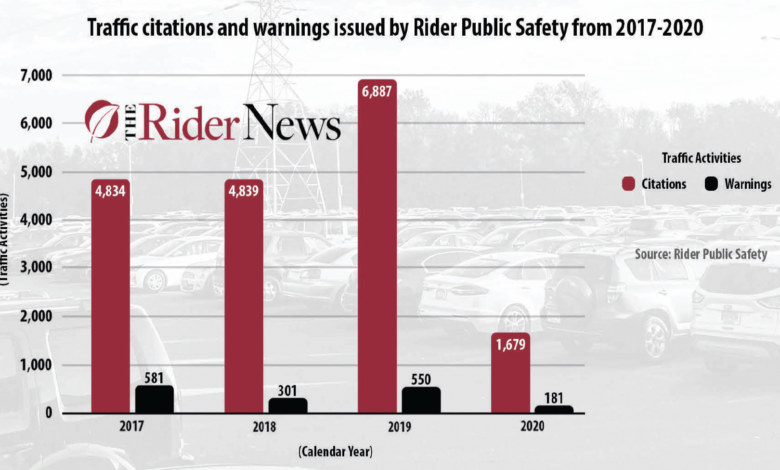
Parking passes, potholes and passionate peers
By Andrew Coates
WITH a new parking fee imposed on campus, Rider Public Safety has yet to provide any information regarding the number of parking permits sold this fall and income generated by traffic violations since 2020.
Rider students found no significant changes to campus roads and parking lots in the new school year, despite promises made by the university.
Ebenezer Abreu, a sophomore accounting major said, “Having to pay for something that was once free is angering.”
Last summer, students received an email announcement about having to pay to park on campus. Students could buy a full year permit for $250 or a semester permit for $125. The university also stated it would be required by the state to collect sales tax for permits purchased by commuting students.
At a meeting with faculty and staff early in the fall semester, Rider President Gregory Dell’Omo projected that the university would see $550,000 in revenue from the new fee.
According to the number of enrolled students for the fall 2023 semester provided by Vice President of Enrollment Management Drew Aromando, the university should hit the goal; with 2,348 commuters, the university would generate $587,000 if every single commuter purchased a full-year pass.
Along with the permit fee, Rider’s website provides that 50 new parking spaces will be repurposed for residential students in front of the Bart Luedeke Center in addition to road repairs and parking lot improvements across campus. However, students mentioned they are not finding these changes implemented and Public Safety hasn’t provided an update.
Katie Blowitski, a sophomore music education major, described her disappointment with parking as a commuter. She paid for a permit but never picked it up; however, no consequences have come of this.
“They have been very inefficient with how they’re getting [the parking passes]out. Even like last year, getting the parking permits, we were just able [to go to Public Safety], and then they would print it out for us … you could get everything done at Public Safety, right there. This year it kind of feels like a hassle,” said Blowitski.
Blowitski’s other problem with parking was limited options. While she was registered to park in the lots near the BLC, a majority of Blowitski’s classes are on the far side of campus. She viewed it as an inconvenience and a potential danger to her safety.
“As a Westminster student, the parking spots by the BLC are way too far from everything, and when you’re on campus from like 8 a.m. to 9:30 p.m., it can be a really big issue of not just inconvenience, but also safety because you’re walking all the way from Fine Arts or Gill Chapel. … Parking at Poyda or one of those athletic lots makes it so much easier,” said Blowitski.
Abreu shared Blowitski’s sentiments and said he did not enjoy the process that Public Safety made students go through.
“Last year you could just pay, and you could just come in and they give [a parking pass] to you,” said Abreu. “This year they didn’t tell us that, we had to go and ask. Then we paid, and then you had to wait until they gave it to you because it took a while.”
Abreu mentioned that dealing with Public Safety was difficult for him in the past because he forgot to display his parking pass and received a ticket.
“Eventually, they did wipe the ticket, but the process was annoying,” said Abreu.
Parking tickets generate another form of revenue for Public Safety. Fines range from $20 for parking in the wrong spot to $40 for speeding.
From July 2016 to June 2019, Rider assessed an average of $129,197 each fiscal year for traffic violations, according to data provided by Public Safety last year.
In fiscal year 2020, which included the campus closure due to COVID-19, that number plummeted to $19,300.
Director of Public Safety James Waldon and Vice President for Facilities and University Operations Mike Reca both declined to provide updated statistics this fall.
“This does not preclude we will be able to accommodate your request in future semesters,” said Waldon in an email regarding the requested parking information.
Students offered ideas which might provide solutions to their parking problems. Sophia Fleischer, a sophomore behavioral neuroscience major, preferred to see an improved parking lot for commuters after citing issues she had with the current parking lot.
“I’m always in the overflow, there’s a lot of potholes. I don’t appreciate the layout of it. It sort of feels like going through a labyrinth. And I stay very late hours here; I do a lot of stuff. So getting to that lot in the dead of night, it’s very terrifying. There’s no lights…and there’s not an emergency light,” said Fleischer.
Suggestions like Fleischer’s have potential to become a reality, according to Student Government Association President Naa’san Carr, who said that while SGA never encourages adding fees for students, things like a permit fee can be a necessity for an academic institution.
“Instituting a permit, which charges students, it now puts the power in the students’ hands again, of course, for us to keep the administration accountable for what they are doing. So as you noticed the potholes and the repaving of things, that’s what this fee should be going toward. We, as the students, should be advocating for the things that we need,” said Carr.
Carr mentioned that any suggestions regarding parking and campus roadways are welcome as SGA continues to work with the university to provide beneficial changes to campus. He encouraged students to reach out to him directly or to the SGA email.
Students who would like their voice to be heard about parking on campus can email sga@rider.edu or carrnaa@rider.edu.


